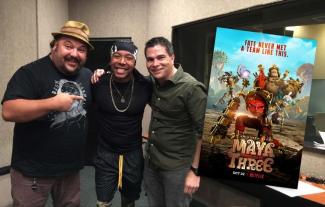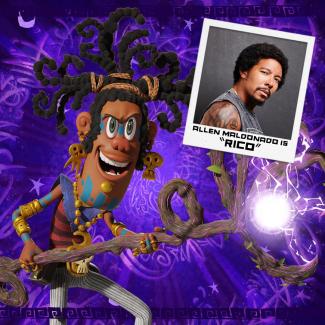Consulting on Netflix show 'Maya and The Three'

When John Gomez was asked to consult on the Netflix animated series Maya and The Three, he jumped at the chance. Here he tells us all about how he became involved and what the experience was like.
I first learned about stuttering when I was at Graduate school to become a speech & language therapist. Like so many others, I assumed that the physical characteristics of stuttering were the most vital elements to understand. Then, because of an enlightened instructor, I learned about how stuttering can impact the whole person. I was intrigued, and I have tried to better educate myself and those around me about stuttering from that moment forward.
Poor media representation
Although I do not stutter myself, stuttering is often on my mind. In particular, I have had numerous thoughts and conversations about the disappointing portrayals of people who stutter in the entertainment industry. As we know, there have been many characterisations that do injustice to people who stutter. These depictions are often used as a device to achieve a comedic effect, and they are typically one-dimensional.
What if Marvel featured a character that stutters? Suppose the portrayal was multi-layered and non-stereotypical...I think it would go a long way toward educating the public about stuttering and, in the process, creating a slightly more empathetic world.
To be fair, some performances have been ennobling and uplifting to people who stutter (eg The King's Speech). However, those characterisations are a rarity. Furthermore, I have heard from some individuals who stutter that they are not concerned about being an 'inspiration.' Instead, they want to see truthful depictions that subvert the stereotype.
About five years ago, I made a documentary called 'When I Stutter' that aims to depict the experiences of people who stutter in an unfiltered way. While I am proud of my film's impact, a micro-budget documentary only has so much reach to general audiences. Like many advocates for people who stutter, I longed for more from the entertainment industry.
I've often wondered what would happen if a big-budget film or TV series had a prominent character who stuttered. For example, what if Marvel featured a character that stutters? Suppose the portrayal was multi-layered and non-stereotypical. In that case, I think it would go a long way toward educating the public about stuttering and, in the process, creating a slightly more empathetic world. Unfortunately, Marvel has not featured a superhero who stutters…
Call from Netflix
One day, I received a phone call from someone at Netflix. He explained that their animated division were working on a series called 'Maya and The Three' which would feature a prominent character named Rico who stutters. He shared the impressive creative vision for the show and told me they were looking to hire a consultant to ensure that Rico was portrayed with accuracy and sensitivity. I was then asked if I was interested in the job, and of course I was all in.
Maya and The Three is all about a warrior princess in ancient Central America, Maya (voiced by Zoe Saldana), who has the great responsibility of upholding a prophecy to defeat the ruler of the underworld, Lord Mictlan (Alfred Molina). Rico is one of three essential members of Maya's team.
Making the show
The first meeting with the Maya production team was an unforgettable experience. I had reviewed the script in advance to make suggestions about the character's storyline, dialogue, and stuttering behaviours. The team's openness to my suggestions was as impressive as it was endearing. The director Jorge Gutierrez told me that he identified as a person with autism. He wanted to highlight stuttering because he thought, like autism, it was often misrepresented in the media.

I appreciate that Rico is a dynamic, empowered, fun-loving, heroic, cool and essential character. I also love that some children will learn about stuttering in a dignified way through Rico.
The five days when we recorded Rico were some very magical days for me. Jorge asked me to sit next to him as he directed the talented Allen Maldonado. Through his vocal talent, Allen brought Rico to life. I was there, line by line, to answer any questions that either of them had and to interject ideas for the character when appropriate. Allen was laser-focused on being authentic with his stuttering behaviours and, more importantly, committed to creating a dynamic and multi-layered character.
Maya's reception
In the end, Maya and The Three was a big hit for Netflix here in the States when it debuted last October 22nd (On International Stuttering Awareness Day funnily enough). The magical journey was spellbinding to kids and they loved all the characters, especially Rico. The feedback that I have received from adults has also been largely positive.
You can watch a clip from the show where Rico joins the quest.
Working on Maya and The Three has been a highlight in my career, and I am very proud to have had the opportunity to work on the series. However, a part of me knows that the show could have done even more in the realm of stuttering. Because of a non-disclosure agreement, I cannot go into details. Suffice it to say, a consultant has some influence on the creative process; however, it is just one perspective among many.
Nevertheless, I am happy with the big picture. I appreciate that Rico is a dynamic, empowered, fun-loving, heroic, cool and essential character. I also love that some children will learn about stuttering in a dignified way through Rico. While the entertainment industry can still do better, progress is happening, and there are individuals in entertainment striving to shine a positive light on stuttering. The director Jorge Gutierrez is one of them, and I suspect he will contribute more to the cause.
Maya and The Three is available to watch on Netflix now. The character Rico is introduced in episode 2. What do you think of the show's portrayal of Rico? We'd love to know your opinion. Email us at editor@stamma.org .

































